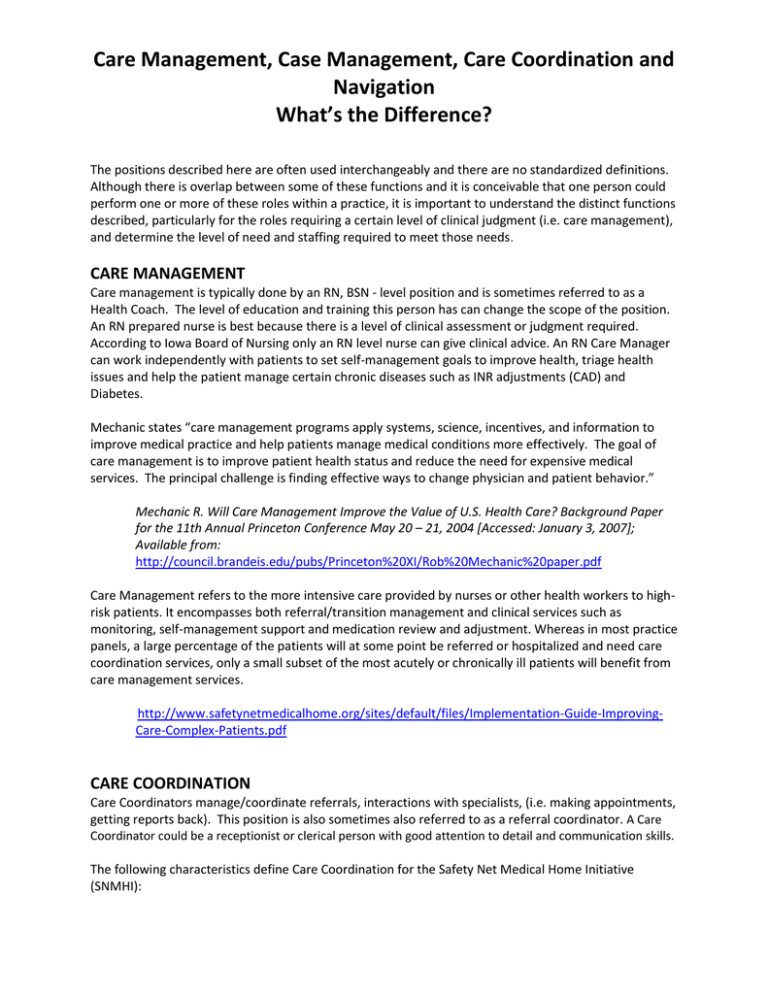Care Management, Case Management, Care Coordination and
advertisement

Care Management, Case Management, Care Coordination and Navigation What’s the Difference? The positions described here are often used interchangeably and there are no standardized definitions. Although there is overlap between some of these functions and it is conceivable that one person could perform one or more of these roles within a practice, it is important to understand the distinct functions described, particularly for the roles requiring a certain level of clinical judgment (i.e. care management), and determine the level of need and staffing required to meet those needs. CARE MANAGEMENT Care management is typically done by an RN, BSN - level position and is sometimes referred to as a Health Coach. The level of education and training this person has can change the scope of the position. An RN prepared nurse is best because there is a level of clinical assessment or judgment required. According to Iowa Board of Nursing only an RN level nurse can give clinical advice. An RN Care Manager can work independently with patients to set self-management goals to improve health, triage health issues and help the patient manage certain chronic diseases such as INR adjustments (CAD) and Diabetes. Mechanic states “care management programs apply systems, science, incentives, and information to improve medical practice and help patients manage medical conditions more effectively. The goal of care management is to improve patient health status and reduce the need for expensive medical services. The principal challenge is finding effective ways to change physician and patient behavior.” Mechanic R. Will Care Management Improve the Value of U.S. Health Care? Background Paper for the 11th Annual Princeton Conference May 20 – 21, 2004 [Accessed: January 3, 2007]; Available from: http://council.brandeis.edu/pubs/Princeton%20XI/Rob%20Mechanic%20paper.pdf Care Management refers to the more intensive care provided by nurses or other health workers to highrisk patients. It encompasses both referral/transition management and clinical services such as monitoring, self-management support and medication review and adjustment. Whereas in most practice panels, a large percentage of the patients will at some point be referred or hospitalized and need care coordination services, only a small subset of the most acutely or chronically ill patients will benefit from care management services. http://www.safetynetmedicalhome.org/sites/default/files/Implementation-Guide-ImprovingCare-Complex-Patients.pdf CARE COORDINATION Care Coordinators manage/coordinate referrals, interactions with specialists, (i.e. making appointments, getting reports back). This position is also sometimes also referred to as a referral coordinator. A Care Coordinator could be a receptionist or clerical person with good attention to detail and communication skills. The following characteristics define Care Coordination for the Safety Net Medical Home Initiative (SNMHI): Care Management, Case Management, Care Coordination and Navigation What’s the Difference? Links patients with community resources to facilitate referrals and respond to social service needs. Integrates behavioral health and specialty care into care delivery through co-location or referral protocols. Tracks and supports patients when they obtain services outside the practice. Follows-up with patients within a few days of an emergency room visit or hospital discharge. Communicates test results and care plans to patients/families http://www.safetynetmedicalhome.org/sites/default/files/Implementation-Guide-CareCoordination.pdf CASE MANAGEMENT The role of the case manager is broader than health care. The case manager addresses the other social determinants of health and assists patients with things like housing, domestic violence, food assistance, etc. The Case Management Society of America defines case management as “a collaborative process of assessment, planning, facilitation and advocacy for options and services to meet an individual’s health needs through communication and available resources to promote quality cost-effective outcomes”. NAVIGATION Patient navigation refers to the assistance offered to patients in “navigating” through the complex health-care system to overcome barriers in accessing quality care and treatment (e.g., arranging financial support, coordinating among providers and setting, arranging for translation services, etc). In the National Cancer Institute’s model, navigators also emphasize a patient-centric model, noting that “a navigator is someone who understands the patient's fears and hopes, and who removes barriers to effective care by coordinating services, increasing a cancer patient's chances for survival and quality of life.” National Cancer Institute. NCI's Patient Navigator Research Program: Fact Sheet: What Exactly is a Patient Navigator? [Accessed: January 25, 2007]; Available from: http://www.cancer.gov/cancertopics/factsheet/PatientNavigator


